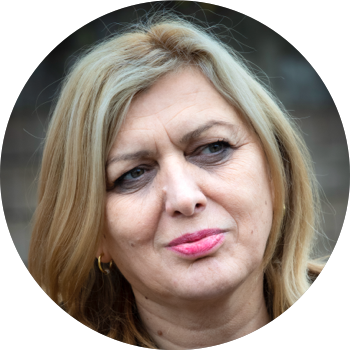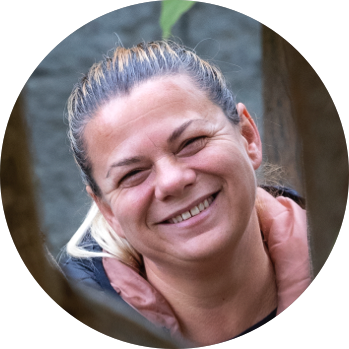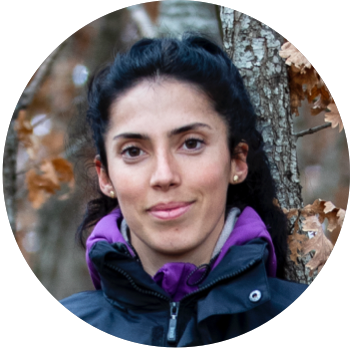Project Background
In Kosovo, women were recruited for the first time in demining teams in 1999, a landmark moment that paved the way for women’s increasing access to employment opportunities in the mine action sector globally. Through this project, the Geneva International Centre for Humanitarian Demining (GICHD) revisited and celebrated the role of women working in demining teams in Kosovo both twenty years ago and today.

Saranda Kastrati
Saranda was a deminer for Norwegian People's Aid (NPA) in 1999-2000. In May 2000 she was injured in a demining accident and her foot was amputated. After six months, she returned to NPA, where she works to this day in community liaison and explosive ordnance risk education.
"After the accident, I started working in explosive ordnance risk education. I visited other people who’d had accidents and I met deminers from other organisations. I felt like it was my responsibility to do it."

Diana Sadrija
After returning to Kosovo from Switzerland, where her family sought refuge during the war, Diana has been working for The HALO Trust as a deminer and a medic. While working in these roles, she has also earned a bachelor’s degree in nursing from the University of Prishtina.
“Despite many challenges, I have been able to balance school and work. It is a very good feeling.”

Delfina Lokaj
Delfina worked for NPA from 1999 to 2001 as a supervisor of an all-women demining team. At first, she had low confidence in her ability to do the job. Her self-confidence increased greatly over time both at work and personally, as well as her awareness of what women can do.
“You need to get along with others, have discipline, and be straightforward. These are the three key components of a successful leader.”

Merdije Luma
Since 2006, Merdije has worked for The HALO Trust as a deminer and a nurse. This is her first job. Not only has this job enabled her to bring food to the table, but also to support her children’s education.
“Before demining, I used to be a very shy person. I am very different now. I am more communicative, I have more freedom.”

Gordana Vučinić
Gordana has worked for NPA since 2019. She is the team leader of an all-men team, which she considers to be her second family. Being a mother, a wife and a team leader can be difficult at times, but she is very proud of herself and of what she has accomplished so far.
“I was afraid that they wouldn’t accept a woman as a team leader. Because the idea still exists that it’s not a job for women ... The team has exceeded my expectations, it’s perfect.”

Berlinda Benisha
Berlinda remembers feeling strong and proud of herself when she was a deminer for The HALO Trust between 1999 and 2001. She found the job to be very interesting and she enjoyed working in nature.
“I always felt that I was doing something good, something selfless, so that others could enjoy the land we had cleared.”

Fitore Ferizi
After finishing her studies in teaching, Fitore and her sister wanted to try something new and started working as deminers for NPA in 2021. What she enjoys mostly about the job is to work in nature and the feeling of saving lives.
“Mine action has impacted me a lot... Now I can face life’s challenges without fearing the dangers. I am more independent; I have a purpose in my life now.”

Gjyle Memaj
Between 1999 and 2001, Gjyle was a deminer for The HALO Trust. Whilst not everyone around her was supportive, she believed it was important to persevere in the role and prove that women can do any job a man does, no matter how potentially dangerous.
“I knew it could be a dangerous job, but I enjoyed it. If a woman likes a job, or if she likes to take risks, why shouldn’t she do it?”

Vlora Kastrati Berdakić
One of the first women deminers in Kosovo, Vlora worked for NPA from 1999 to 2001. She remembers walking around in her uniform and feeling the respect of the community. She was very proud. Vlora and Saranda are sisters.
“We removed mines so that no one would step on them. We wanted to avoid any fatal accidents.”

Ivana Stamenković
After working in a hospital, Ivana has been a medic for NPA since 2017. As the only medic for a large team, she has a lot of responsibility. She believes that this job has made her a calmer person in distressing situations. She also enjoys giving advice to younger women at NPA.
“Working for NPA has changed my life in many ways... the very fact that you are doing humanitarian work for the benefit of your community gives invaluable motivation.”
